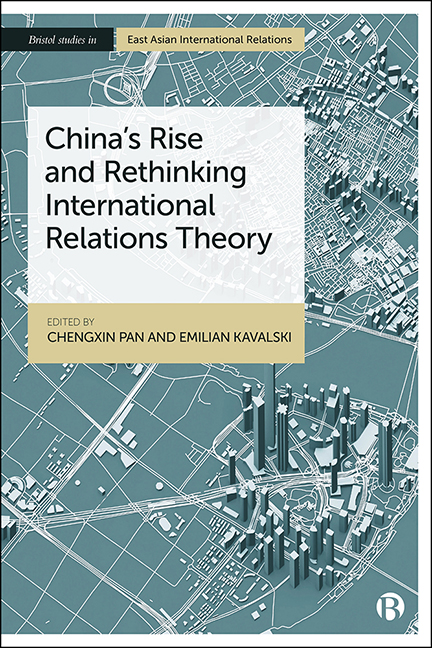Book contents
- Frontmatter
- Contents
- List of Abbreviations
- Notes on Contributors
- Acknowledgements
- Introduction: The Rise of China and Its Challenges to International Relations Theory
- PART I Theorizing China’s Rise: Beyond Eurocentric Knowledge Production
- PART II Theorizing China’s Rise: Critical Reflection on Mainstream Frameworks
- Epilogue: Towards International Relations beyond Binaries
- Index
2 - Heart and Soul for World Politics: Advaita Monism and Daoist Trialectics in International Relations
Published online by Cambridge University Press: 15 September 2022
- Frontmatter
- Contents
- List of Abbreviations
- Notes on Contributors
- Acknowledgements
- Introduction: The Rise of China and Its Challenges to International Relations Theory
- PART I Theorizing China’s Rise: Beyond Eurocentric Knowledge Production
- PART II Theorizing China’s Rise: Critical Reflection on Mainstream Frameworks
- Epilogue: Towards International Relations beyond Binaries
- Index
Summary
Introduction
Let me begin with an anecdote. Here is a review from the New York Times on Prakash Jha's 2010 film, Raajneeti (Politics): ‘Mr. Jha has said he based the dynastic family at the film's heart on characters from the epic “Mahabharata”, and there are also parallels to the Gandhi clan (generation Sonia). But Mr. Jha's real touchstone seems to be “The Godfather” ‘ (Saltz, 2010). The reviewer just did not get it. Because she knew nothing of the Mahabharata (c. 900 BCE), all she could see were Jha's occasional, filmic gestures to Francis Ford Coppola's series on mafia politics in 20th-century America. She completely missed the Mahabharata's key teaching: that is, power comes to naught without a cosmic sense of morality behind it. ‘Raajneeti’ for her thus turned into a cheesy Bollywood derivative of a great Hollywood classic.
Not simply bad or misled, this review reflects a history of ‘epistemic violence’ (Spivak, 1988) perpetrated on the world, amounting to an ‘epistemicide’ (Santos, 2016). Five centuries of colonialism-imperialism have killed knowledge not only in the global South, but also, I add, the global North. The field of International Relations (IR) sets one example. Like the New York Times review, IR suffers from three epistemic blinkers: (1) it fails to access how millions outside of Westphalia World understand power and politics; (2) it cannot benefit from ancient insights, whether these come from the Mahabharata or elsewhere; and (3) it remains ignorant of itself, especially the field's complicity with hegemony and arrogance from it (Ling, 2017).
Epistemic compassion can deliver us from such myopic violence. Like learning a new language, epistemic compassion opens worlds by crossing boundaries previously thought immutable. More than seeing anew, epistemic compassion helps us to feel anew. Utilitarians cross epistemic borders also but for ‘use’ only and not to reflect. Consequently, utilitarians resist any notion of transformation due to new knowledge whereas epistemic compassion begins with it as a premise. No longer trapped in the ‘tragedy’ of power politics (Mearsheimer, 2001), we can appreciate, instead, the joy (Penttinen, 2013; Sarma 2014), beauty (Ling, 2014b) and potential of discovery that our world-of-worlds can offer (Ling, 2014a).
- Type
- Chapter
- Information
- Publisher: Bristol University PressPrint publication year: 2022

